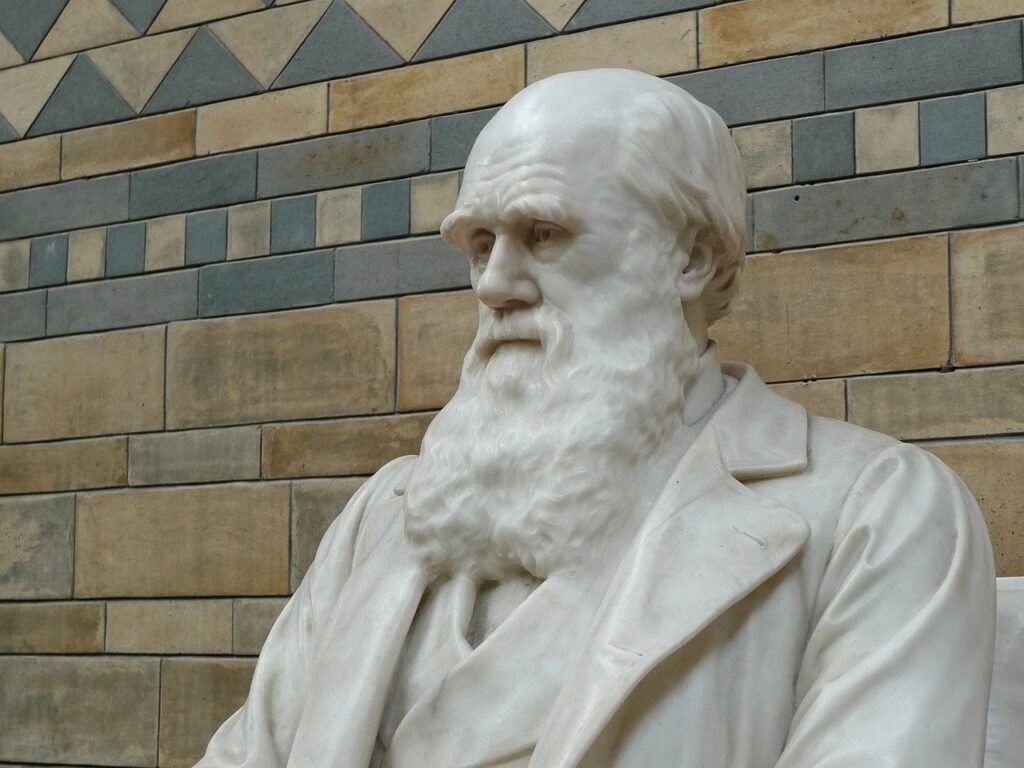Charles Darwin: Introverted Scientist and Pioneer of Evolution

There are some figures in the history of science who have changed the course of human civilization through their thinking alone. Charles Darwin is one of them, but he was not only a great scientist, he was a true introvert. His love of solitude, keen observation, and thoughtful mind made him the pioneer of the theory of evolution.
Darwin was never very social. He was a quiet person from childhood, who spoke little in front of everyone but would sit quietly and observe deeply. Although he did not have much interest in conventional school studies, his curiosity about nature and the animal world was boundless. This curiosity helped him give birth to a theory that is still considered one of the greatest discoveries in science today.
The question is, was Charles Darwin’s introverted nature the reason for his success? In today’s society, introverts often feel that they are behind extroverts. But Darwin’s life teaches us how powerful deep observation, concentration, and the ability to think in isolation can be.
In this article, we will analyze:
What was Darwin’s introverted nature like?
How did his introverted nature help him formulate the theory of evolution?
What can introverts learn from his life?
Darwin’s story is not just the story of a scientist, it is an inspiring example for introverts, which proves that a thoughtful, quiet person can change the way the entire world thinks.
Charles Darwin's introverted nature: How did it make him a great scientist?
Charles Darwin was not only the father of the theory of evolution, he was a man whose personality took him to a unique level. In today’s era, many introverts believe that being less socially active can be a hindrance to success. But Darwin’s life proves that quiet, thoughtful, and deeply observant people can also make a huge difference.
1. Introverted and thoughtful since childhood
Charles Darwin was different from his childhood. He never talked much and was not comfortable in large groups or social events. Instead, he preferred to spend time alone in nature.
While other children were busy playing sports, Darwin thought about various things in the natural world. He used to collect various animals and insects from a young age and observe their structure and behavior in depth. His parents and teachers often said that he was too much of a thinker and not very active in real life. But later, this deep observation power helped him discover one of the revolutionary theories of science.
2. Loneliness and interest in deep research
Darwin was never interested in the conventional education system. He liked to read books, make notes, and gain knowledge through his own research. He was not very active in social life, but rather spent his time doing research in solitude.
Even while studying at Cambridge University, he was not very interested in classes; his mind was focused on observing nature and biodiversity. His introverted nature prepared him for research according to the needs of the time. This characteristic later inspired him to write one of the best studies of the past few centuries, “On the Origin of Species”.
3. Observational skills and analytical thinking
An important characteristic of introverts is that they talk less, but observe and think deeply. Darwin was no exception. When he arrived at the Galapagos Islands on the Beagle, others were generally enjoying the beauty of the islands. But Darwin was deeply observing the structure, diet, and lifestyle of the animals.
He noticed that the beaks of birds of the same species had become different in different parts of the island. This observation led him to the theory of “Natural Selection”, which laid the foundation for modern evolution.
4. Writing Skills and Fear of Public Speaking
Another important characteristic of introverts is that they are more comfortable expressing their thoughts through writing than in public. Darwin did not get involved in direct debates, but rather recorded his research in the book “On the Origin of Species”. His research was so powerful that it caused a stir in the entire scientific world after its publication.
He wanted to convey through his work that only those animals that are able to adapt to their environment survive. However, Darwin was initially hesitant to publish his theory, because he knew that it would clash with traditional religious beliefs. It is a common characteristic of introverts that they do a lot of research and scrutiny before publishing new ideas.
5. Introverts are the ones who lead him to success
Charles Darwin’s life proves that introverts are not only successful, but they also have the power to change the history of science.
His introverted nature made him more focused and keenly observant.
He was able to completely immerse himself in his research, avoiding social engagements.
He had the ability to work alone, which helped him complete long-term research.
He expressed his thoughts through writing rather than going into direct debate, which made him more acceptable.
Charles Darwin’s introverted nature was not only his personal characteristic, but it was also an important reason for his becoming a scientist. His observational skills, thoughtfulness, deep research and love of solitude made him one of the most important scientists in history.
In today’s era, introverts often feel that they are lagging behind the mainstream of society. But Darwin’s life proves that a calm and thoughtful attitude can be the greatest power, if used properly.
Charles Darwin's introverted traits: How did it make him successful?
Charles Darwin is a huge name in the history of science. He taught the whole world to think anew with his ‘Theory of Evolution’. But his great contribution was not only the result of talent, his introverted nature helped him become such a great scientist. Darwin was a thoughtful, silent observer and a person used to solitary research, which prepared him to discover something new.
Now the question is, how did Darwin achieve such great success because of being an introvert? Let’s find out.
1. Deep observational skills: The ability to sit and think in solitude
The strongest quality of introverts is that they can observe in detail and think deeply about something for a long time.
Darwin had been observing nature since childhood and learned in his own way outside of the conventional education system. When he went to the Galapagos Islands on the Beagle, while other explorers generally enjoyed nature, Darwin was deeply observing the structure and behavior of animals and plants. His silent observation and patience helped him discover the theory of “Natural Selection”.
If Darwin had not been an introvert and had not had a thoughtful attitude, the foundation of the theory of evolution might not have been formed.
2. Concentration in research: the ability to work alone
Darwin’s introverted nature allowed him to work alone for long periods of time. Introverts are usually more comfortable working in their own minds rather than social interactions, which is ideal for research.
Darwin worked on his research for more than 20 years, which further strengthened his theory of evolution. He repeatedly tested and analyzed his theory, which increased the acceptance of his theory.
His writing skills and patience helped him write the book “On the Origin of Species”, which changed the history of science.
If he had been an extrovert and had spent time in social activities, he might not have been able to do such in-depth research.
3. Presenting strong arguments without controversy
Darwin presented one of the controversial theories of his time, which was contrary to the prevailing religious beliefs. He presented evidence patiently, standing on the solid foundation of his research, rather than going directly into a debate.
He would discuss with scientists personally and explain the logic of his theory. Due to his thinking power and perseverance, it was possible to perfect his research step by step. Another quality of introverts is that they do not make hasty decisions, but think step by step. Darwin did the same.
4. Ability to express thoughts through writing
Introverts usually do not talk much, but they feel more comfortable expressing their thoughts through writing. Darwin preferred to explain his theory through books rather than arguing orally. He wrote a summary of his research for many years, so that his theory would be scientifically acceptable. After “On the Origin of Species” was published, it caused a stir all over the world, because it was the result of detailed research.
If he had wanted to argue directly with logic, then perhaps so many scientists would not have accepted his theory.
5. Patience and stable mentality
Introverts have more patience and the ability to think long-term. This can also be seen in Darwin’s case.
He knew that it would take time for his theory to be accepted, so he continued his research patiently.
He did not expect quick success, but rather researched and waited on every aspect of the theory.
He responded to every criticism with research data, not with emotion.
This patience and planned presentation helped his theory survive.
Introverted nature made Darwin a great scientist Charles Darwin’s life proves that being an introvert is not a weakness, but a great strength.
Deep observational skills helped him understand changes in nature.
Skill in solitary research encouraged him to work for long periods of time.
Presenting evidence without controversy made his theory more acceptable.
The ability to express his ideas through writing has immortalized him in the history of science.
Patience and a stable mentality helped him survive even in the face of severe criticism.
Introverts can learn from Darwin’s story that if their thinking, observational skills, and deep attention can be used correctly, they can change the world.
Theory of Evolution and Education for Introverts
Theory of Evolution: Nature’s Own Selection Process
Charles Darwin’s “Theory of Evolution” is a groundbreaking discovery in the history of science and biology. According to him, the biological world changes through a process called natural selection, and over time, only the fittest species survive.
Key ideas:
Every living thing in the biological world fights for survival.
Animals that have greater adaptability survive and reproduce.
Animals undergo physical and mental changes over time.
Now the question is, what does this theory of evolution teach introverts?
Lessons from the theory of evolution in the lives of introverts
Just as nature requires change and adaptation, introverts also have to learn to adapt to different situations in life.
1. Adaptation is necessary to survive
There are many animals in nature that have adapted to their environment and have survived for a long time. This is also important for introverts.
Introverts naturally talk less and are deep thinkers.
To survive in a career or social life, you have to learn some social skills.
Introverts also have to make small changes to fit in with the situation so that they can adapt well to society.
Education: Being an introvert is not a weakness, but if social skills and communication strategies can be learned, then survival will be easier.
2. “Survival of the Fittest” means not the strongest, but the most adaptable
Darwin said that it is not the strongest of the animals, but those who can adapt to change, that survive.
Many introverts think that it is difficult to succeed in life if they are not extroverted. But in reality, this is not true.
Introverts are good at deep thinking, patience, and long-term planning.
They should use their strengths to pave the way for success.
Education: Introverts do not have to be like others, but they should use their strengths to move forward.
3. Patience and long-term planning are important
Evolution is a long-term process. It does not happen overnight, but rather it takes thousands of years for a species to change.
Introverts do not usually make quick decisions, but rather analyze deeply.
Patience and planning are very important to succeed in life.
Many successful introverts like Bill Gates, Mark Zuckerberg or Charles Darwin have succeeded through long-term planning.
Education: To achieve something big in life, you need to be patient and set long-term goals.
4. Improving your skills is essential to survive in the competition
According to the theory of evolution, those who cannot adapt to the new environment become extinct.
In the current era, competition is very high. So introverts need to improve their skills.
Confidence, communication skills and networking need to be learned little by little.
One can use their skills by using technology and digital platforms.
Education: Introverts need to learn to improve themselves to survive in the competition.
5. It is important to maintain your individuality
Evolution has created certain characteristics in every animal that set them apart from others.
This is also true for introverts.
Introverts are usually deep thinkers, analytical, and creative.
They speak less, but when they do, it is important.
They should maintain their individuality and not try to be like others.
Education: If introverts maintain their individuality and use it, they will be successful. Learn more about this.
How can introverts take inspiration from the theory of evolution?
The main lesson of the theory of evolution is to adapt to change.
If introverts understand their strengths and improve their skills, they will be able to survive in the competition of life. To be successful, patience, long-term planning, skill development, and self-confidence are very important.
Being an introvert is not a problem, but rather a strength, if it is used correctly. You can share your experience here.
- Category : Introvert Articles
- Author : Tuhin Bin Alamgir



